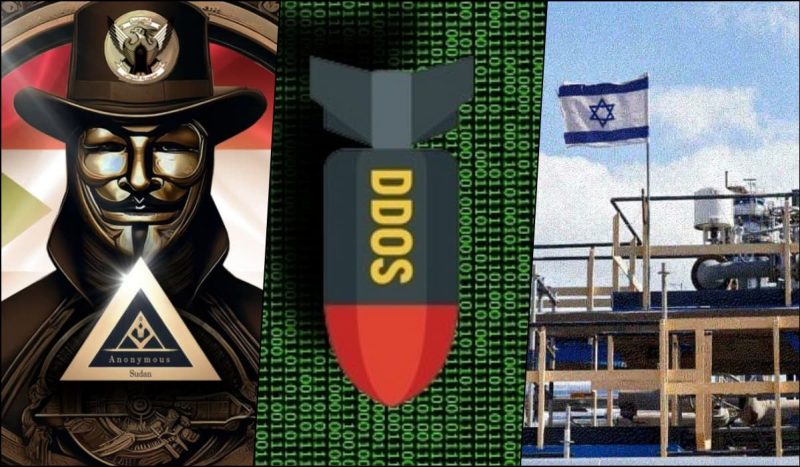Anonymous Sudan has also claimed responsibility for DDoS attacks on Thuraya Mobile Satellite Communications Company, an international mobile-satellite service (MSS) provider based in Dubai, United Arab Emirates (UAE).
Anonymous Sudan, the pro-Palestinian hacktivist group, has taken credit for a series of Distributed Denial of Service Attacks (DDoS attacks) on BAZAN Group, Israel’s top oil refinery operator. This recent claim closely follows their announcement of targeting the London Internet Exchange (LINX) in protest against the Yemen strikes.
On Wednesday evening, January 17, the DDoS attacks began with notable intensity, causing extensive disruptions in the network of BAZAN Group’s critical infrastructure. The scale of the impact was confirmed by NetBlocks, a global internet monitoring platform specializing in tracking outages, disruptions, and censorship events worldwide.
On Wednesday, NetBlocks officially reported a significant network disruption affecting Bazan Group through its official X account on Twitter. Simultaneously, Anonymous Sudan took to its Telegram channel to announce and claim responsibility for the orchestrated attack.
⚠️ Confirmed: Live metrics show a major disruption to the network of Bazan Group / Oil Refineries Ltd petrochemical company in #Israel; prolific hacktivist group Anonymous Sudan has claimed a cyberattack on the company, which operates the country’s largest oil refinery 📉 pic.twitter.com/SUKmiI45t1
— NetBlocks (@netblocks) January 17, 2024
“We have conducted a huge cyber attack on the digital infrastructure of one of the biggest oil refining and petrochemicals companies in Israel,” the group said. The statement was followed by additional details of what was hit and what remained untouched.
“Their entire infrastructure has been hit hard. Note; some irrelevant public-facing BAZAN websites may be up; however, the important infrastructure servers are confirmed to be down,” the group claimed.
The hacktivist group stated that the motive behind targeting the BAZAN Group was in direct response to Israeli aggression against Palestinians. The group mentioned that the DDoS attacks were a form of protest, stating that “Attacks against Israel will continue as they continue their genocidal campaign on Gaza.” The group claimed responsibility for any damage to the overall health of BAZAN Group and any collateral damage resulting from the DDoS attacks.
This incident is not the first time Bazan Group has faced DDoS attacks. In July 2023, another pro-Palestinian group named Cyber Avengers claimed responsibility for an attack on the company. Consequently, the group’s websites were taken offline and restricted to users outside Israel.
It is worth noting that on January 16, 2023, Anonymous Sudan also claimed responsibility for targeting Thuraya Mobile Satellite Communications Company, an international mobile-satellite service (MSS) provider based in Dubai, United Arab Emirates (UAE).
Anonymous Sudan revealed that their targeting of Thuraya was motivated by the belief that the company’s satellites are utilized by the Rapid Support Forces (RSF) for communication. Notably, RSF is a paramilitary force formerly operated by the Government of Sudan, accused by the hacktivists of committing war crimes against the Sudanese people.
The recent series of DDoS attacks orchestrated by hacktivist groups such as Anonymous Sudan against prominent entities like BAZAN Group and Thuraya Mobile Satellite Communications Company highlight the growing cybersecurity threats targeting critical infrastructure.
Beyond the immediate disruption caused to the targeted organizations, these incidents expose the vulnerable state of IoT devices. DDoS attacks not only compromise the functionality of essential services but also serve as potent tools for expressing political or ideological grievances.
The danger lies not just in the immediate impact on the targeted entities but in the potential ripple effects, affecting users, businesses, and, in the case of BAZAN Group, the broader energy sector.
As cybersecurity threats evolve in sophistication and scale, the need for strong security measures becomes increasingly crucial to safeguard against potential economic, social, and geopolitical consequences arising from such malicious activities.
RELATED ARTICLES
- Hamas hacked smartphones of over 100 IDF soldiers
- 10 Top DDoS Attack Protection and Mitigation Companies
- Hacktivists Trageting Critical ICS Infrastructure in Israel and Palestine
- Hamas hacked of IDF soldiers’ phones using seductive female images
- Protestware Uses npm Packages to Call for Peace in Gaza and Ukraine
- Crypto Scammers Exploit Gaza Crisis, Deceiving Users in Donation Scam










